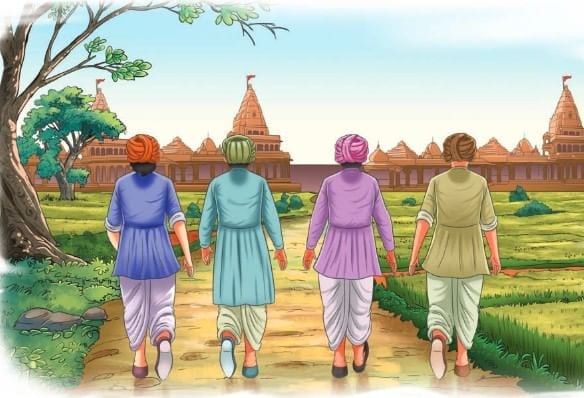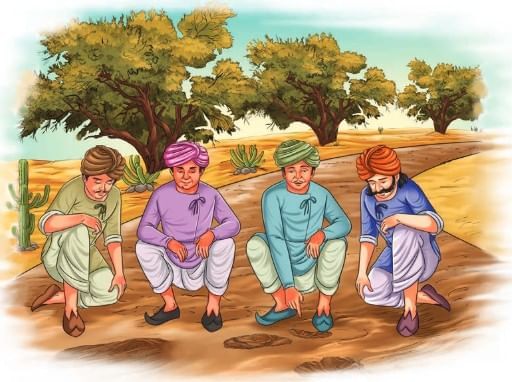Short and Long Answer Questions: Wisdom Paves the Way | English Poorvi Class 8 - New NCERT PDF Download
Short Answer Questions
Q1. Why are the four young men tired when the story begins?
Ans: The young men are tired because they have been traveling for ten days. They have walked a long way from their village to Ujjain to find jobs. Their journey has been hard and dusty.
Q2. What do the young men hear as they walk toward Ujjain?
Ans: They hear the faint noise of the bustling city of Ujjain in the distance. The sound shows that the city is busy and lively. This gives them hope for finding work.

Q3. What does Ram Datt hope the King will do for them?
Ans: Ram Datt hopes the King will recognize their talents and give them jobs. He believes the King will see their skills and offer them work in his service. This is their main goal for going to Ujjain.
Q4. Why does Har Datt say meeting the King will be difficult?
Ans: Har Datt says meeting the King will be difficult because it’s not easy to get an audience with him. They need a plan to reach such an important person. This shows they must be clever to achieve their goal.
Q5. How does the merchant act when he first meets the young men?
Ans: The merchant is panting and distressed when he meets the young men. He is in a hurry and looks worried because his camel is missing. This makes him anxious and eager for their help.
Q6. What does the merchant offer to do if the young men can cure his camel?
Ans: The merchant offers to pay a fee if the young men can cure his camel’s stomach pain. He thinks they might be healers because they know so much about his camel. This shows his surprise and trust in their knowledge.
Q7. Why does Dev Datt suggest waiting under the banyan tree?
Ans: Dev Datt suggests waiting under the banyan tree if the King wants to see them. He is calm and confident they can explain themselves. This shows they are not afraid of facing the King.
Q8. What does the King demand from the merchant in the court?
Ans: The King demands that the merchant speak his accusation clearly. He does not want any confusion in his court. This shows the King is fair and wants to understand the situation properly.
Q9. How does the King describe the young men’s reasoning?
Ans: The King says their reasoning is flawless and shows wisdom beyond just seeing things. He is amazed that they know so much about the camel without seeing it. This makes him value their intelligence.
Q10. Why does the merchant feel ashamed after the King’s decision?
Ans: The merchant feels ashamed because the King proves his accusations are wrong. The young men are shown to be wise, not thieves, making him realize his mistake. He leaves the court embarrassed.
Q11. How do the young men feel when the King offers them jobs?
Ans: The young men feel honored and grateful when the King offers them jobs as advisers. They are humbled because they didn’t expect such a high position. This fulfills their dream in a big way.
Q12. What does the story teach about working together?
Ans: The story teaches that working together and supporting each other can lead to success. The four young men stay united and share their observations, which helps them impress the King. Their teamwork leads to great jobs.

Long Answer Questions
Q1. Describe the setting of Scene I and how it shows the young men's determination.
Ans: Scene I is set on a dusty road leading to Ujjain, with the city visible in the distance under a high midday sun. The four young men look tired from travel but keep walking with resolute eyes, showing their strong will to find work. They talk about their long journey of ten days, yet they stay hopeful about meeting the King. This setting highlights their unity and patience, as they press on despite the heat and uncertainty. Their determination is clear when they decide to examine the camel tracks carefully while continuing forward.
Q2. Explain the role of the Merchant in the story and how his actions lead to the climax.
Ans: The Merchant is a worried owner who lost his camel and runs into the four men on the road. He asks if they have seen it, and their accurate descriptions surprise him, making him accuse them of theft. His anger leads him to drag them to the King's court, creating the main conflict. This accusation sets up the climax where the men explain their deductions. Without the Merchant's hasty judgment, the men might not have met the King and shown their wisdom.
Q3. How does the King's character show fairness and appreciation for talent?
Ans: The King is a young ruler who listens carefully to both the Merchant and the accused men without bias. He questions each man in detail, nodding thoughtfully at their answers, which shows his fairness. After hearing their logical explanations, he praises their insight and calls their minds rare. He quickly dismisses the false accusation and offers them adviser roles. This appreciation for talent makes him a wise and just leader who values wisdom over quick judgments.
Q4. Discuss the theme of observation and deduction in the four men's discoveries.
Ans: Observation and deduction are key as the men study the camel's tracks closely to learn hidden details. Ram Datt deduces the lame leg from uneven footprints, showing careful watching. Shiv Datt uses untouched leaves to infer blindness, linking sight to behavior. Har Datt connects blood drops to a short tail through logical thinking about defense. Dev Datt notices print depths to conclude stomach pain, proving deduction turns simple clues into deep understanding.
Q5. What lesson does the Merchant learn by the end of the story?
Ans: The Merchant learns not to accuse others hastily without proof, as his quick anger embarrasses him in court. He realizes the men used wisdom from tracks, not theft, to describe his camel. The King's scolding makes him feel chastened and sorry for his mistake. This teaches him to be mindful and think before judging strangers. In the end, he leaves humbled, continuing his search with better caution.
Q6. How do the four young men's responses to the King reflect their humility and unity?
Ans: The four men bow respectfully and answer the King's questions calmly, showing humility despite the false accusation. When offered adviser roles, Ram Datt calls it an undreamed honor, and Shiv Datt expresses gratitude. Har Datt sees serving the King as a privilege, while Dev Datt promises dedicated insights. Their group responses highlight unity, as they speak together and accept as one. This humility and teamwork make them worthy of the King's trust.
Q7. Explain the significance of the court's reaction at the story's end.
Ans: The court's applause at the end signifies approval of the King's wise decision to hire the four men. It shows the kingdom values intelligence and justice, as the men turn from accused to honored advisers. The King's announcement spreads their wisdom as a beacon for prosperity. This reaction fulfills the men's journey unexpectedly, proving wisdom leads to respect. It ends the story on a positive note of celebration and new beginnings.
Q8. How does the story illustrate the difference between knowledge and wisdom through the characters?
Ans: The story shows knowledge as facts, like knowing camel behaviors, but wisdom as using them with judgment, as the men do with tracks. The pre-reading classifies situations, like Riya's plant care as knowledge and Mr. Kumar's family value as wisdom. The four men apply wise deductions beyond mere facts, impressing the King. The Merchant has knowledge of his camel but lacks wisdom in accusing wrongly. The King uses wisdom to recognize talent, guiding his fair ruling.
|
58 videos|435 docs|57 tests
|
FAQs on Short and Long Answer Questions: Wisdom Paves the Way - English Poorvi Class 8 - New NCERT
| 1. What themes are explored in the article "Wisdom Paves the Way"? |  |
| 2. How can one cultivate wisdom according to the article? |  |
| 3. What role does experience play in the process of gaining wisdom? |  |
| 4. Can wisdom be taught, or is it inherently acquired? |  |
| 5. How does the article define the relationship between wisdom and happiness? |  |
















